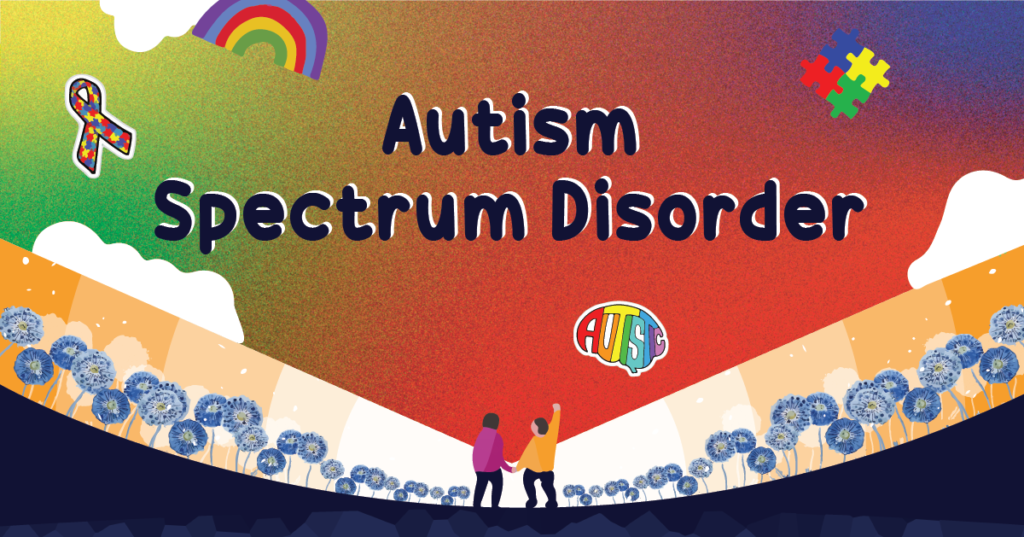What Is Autism?
Autism spectrum disorder (ASD), is a developmental disorder that includes problems with communication and behavior. It can range from very mild to severe and occur in all ethnic, socioeconomic, and age groups.
What Are the Signs of Autism?
Symptoms of ASD generally appear in the first two years of life. However, not all people with ASD will show all behaviours, but most will show several, and the symptoms may also appear earlier or later. The fifth edition of the Diagnostic and Statistical Manual of Mental Disorders (DSM-5) definition recognizes two main symptom areas:
1. Difficulty With Communication And Social Interaction
These can include:
- Taking things literally and not understanding abstract concepts
- Require to have extra time to process information or answer questions
- Seek out time alone when overloaded by other people
- Appear to behave ‘strangely’ or in a way thought to be socially inappropriate
- Find it hard to form friendships
- Not looking at or listening to other people
- Not looking at things when another person points at them
- Problems understanding or using speech, gestures, facial expressions, or tone of voice
- Talking in a sing-song, flat, or robotic voice
- Trouble adapting to changes in routine
2. Restricted Interests and Repetitive Patterns of Behaviors
These can include:
- Repetitive movements, like rocking, flapping their arms, spinning, or running back and forth
- Lining objects, like toys, up in strict order and getting upset when that order is disturbed
- Attachment to strict routines, like those around bedtime or getting to school
- Repeating words or phrases, they hear someone say over and over again
- Getting upset over minor changes
- Focusing intently on parts of objects
- Unusual reactions to sensory input, like sounds, smells, and tastes
- Obsessive interests
- Exceptional abilities, like musical talent or memory capabilities
3. Other Characteristics
Some autistic people might experience additional symptoms, including:
- Delayed movement, language, or cognitive skills
- Seizures
- Gastrointestinal symptoms, like constipation or diarrhoea
- Excessive worry or stress
- Hyperactive, inattentive, or impulsive behaviours
- Unexpected emotional reactions
- Unusual eating habits or preferences
- Unusual sleep patterns
Although people with ASD experience many challenges, they may also have many strengths, including:
- Being able to learn things in detail and remember information for long periods
- Being strong visual and auditory learners
- Excelling in math, science, music, or art
What Causes Autism?
The exact cause of ASD is unknown. But there are some risk factors:
- Autism runs in families
- A child with an older parent
- Low birth weight
- Pregnant women who are exposed to certain drugs or chemicals
- Maternal metabolic conditions
How Is Autism Diagnosed?
An ASD diagnosis involves:
- A developmental screening will tell your doctor whether your child is on track with basic skills like learning, speaking, behaviour, and moving. Experts recommend that all children undergo ASD screening at ages 18 and 24 months. Screening can help identify ASD in children earlier than later. They may benefit from early diagnosis and support.
- If your child shows signs of a problem on these screenings, they’ll need a complete evaluation. Your doctor might want to bring in someone who specializes in autism disorders, like child psychologists, occupational therapists, speech and language pathologists.
If you think your child shows symptoms of ASD, talk to your doctor as soon as possible.
How Is Autism Treated?
There’s no cure for autism. But early treatment can make a big difference in the development of a child with autism. Many approaches involve therapies such as:
- Behavioural therapy
- Play therapy
- Occupational therapy
- Physical therapy
- Speech therapy
- Medications
However, results will vary. Some people may respond well to certain approaches, while others may not. Your doctor should tailor treatment for you or your child.
If You’re Concerned
Remember, ASD is complex. It takes time for an autistic person — whether a child or adult — to find the support program best suited for them.
Visiting our site today, share your concerns and what you’re seeing. There are many ways to support kids diagnosed with autism – helping them feel less alone and connect to the world.
So welcome to Dawn Bridge. We’re thrilled that you’ve joined us on this journey.

